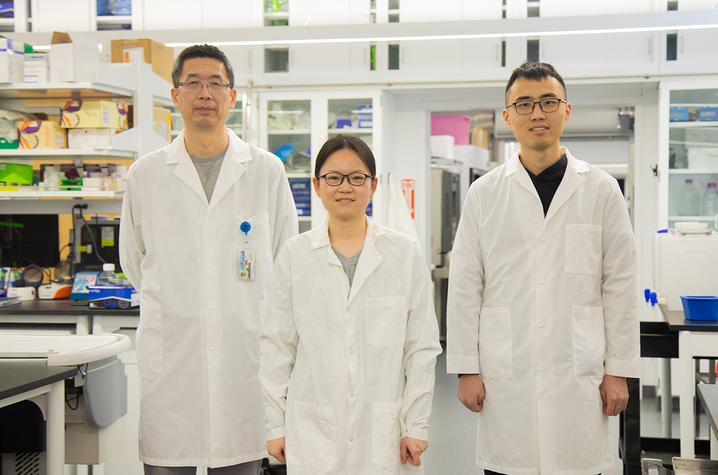UK’s Tong, Yang and Yi winners in NIH TARGETED Challenge

LEXINGTON, Ky. (July 17, 2024) — The research team “ARENEX,” from the Stanley and Karen Pigman College of Engineering at the University of Kentucky, are winners in the Phase 1 competition of the National Institutes of Health (NIH) Targeted Genome Editor Delivery (TARGETED) Challenge.
Team members, from the F. Joseph Halcomb III, M.D. Department of Biomedical Engineering, include: Sheng Tong, associate professor of biomedical engineering; Xiaoyue Yang, postdoctoral scholar; and Zhongchao Yi, a graduate student.
The team’s work focuses on the potential of Clustered Regularly Interspaced Short Palindromic Repeats (CRISPR)-based gene editing technology in treating challenging genetic diseases, such as sickle cell disease and cystic fibrosis.
Despite its promise, in vivo therapeutic gene editing encounters a significant obstacle due to the off-target activities of the CRISPR system. To tackle this challenge, the NIH created a $6 million initiative aimed at developing targeted delivery systems for genome editors to somatic cells within the body.
This initiative encompasses two specific target areas:
- The creation of programmable delivery systems capable of delivering genome editing machinery to target specific tissues or cell types.
- The development of highly efficient nonviral delivery systems with the ability to traverse the blood-brain barrier (BBB) and deliver genome editing machinery to a substantial proportion of clinically relevant cell types in the central nervous system (CNS).
Tong and the UK team proposed an innovative approach to develop artificially engineered exosomes that are functionalized to traverse the BBB, thereby achieving efficient gene editing in neurons. This approach complements the ongoing NIH-funded in vivo gene editing work in Tong’s laboratory.
The impact of such work is far-reaching, according to Tong, who explained the potential for treating diseases affecting the brain.
“Our project aims to develop an innovative gene editing platform that can pass through the blood brain barrier and modify specific DNA sequences in the brain tissue,” he said. “It holds the potential for broad therapeutic applications, including providing cures for many otherwise intractable brain-associated diseases, such as Alzheimer's and Parkinson's, through the modification of related genes.”
NIH announced the winners of Phase 1 of the competition to the public earlier this year. In Phase 1 of the three-part challenge, 54 independent research groups, universities, companies and laboratories submitted proposals outlining their solutions and how they intended to meet the requirements for one of the two target areas. Tong’s ARENEX team was announced as a winner for target area two, receiving $75,000 and the only winning solution in this area awarded to a public university. The UK team was awarded alongside Yale, Cornell and Columbia.
The ARENEX team and other Phase 1 winners were invited to Phase 2 to further advance their research and provide data from experimental testing, demonstrating delivery and editing performance. They will also describe their methodology, technology and how their solution addresses the NIH TARGETED Challenge criteria. Winners of Phase 2 will each be awarded $250,000 and will be eligible to compete in Phase 3, where they will share final data, independent testing and validation.
The UK team is looking forward to Phase 2 of the competition, scheduled to announce winners in April 2025.
As the state’s flagship, land-grant institution, the University of Kentucky exists to advance the Commonwealth. We do that by preparing the next generation of leaders — placing students at the heart of everything we do — and transforming the lives of Kentuckians through education, research and creative work, service and health care. We pride ourselves on being a catalyst for breakthroughs and a force for healing, a place where ingenuity unfolds. It's all made possible by our people — visionaries, disruptors and pioneers — who make up 200 academic programs, a $476.5 million research and development enterprise and a world-class medical center, all on one campus.




